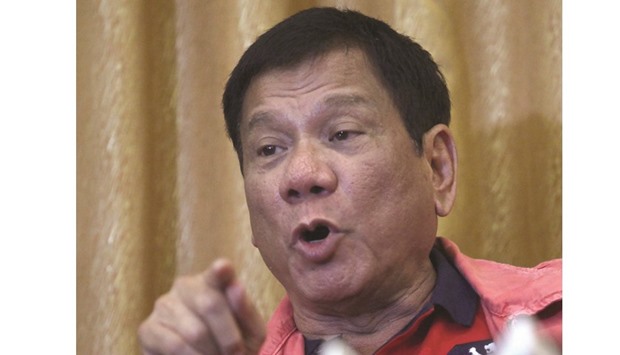Incoming Philippine President Rodrigo Duterte is likely to face higher borrowing costs when he takes office next month as the central bank mops up excess cash.
Deposit auctions by Bangko Sentral ng Pilipinas starting in June are designed to absorb an influx of funds from overseas workers that have kept three-month treasury bill yields below the benchmark rate, making its policy less effective. HSBC Holdings and China Banking Corp predict the 1.674% yield on 91-day bills will climb towards the 2.5% overnight deposit rate that sets the floor of the authority’s rate corridor.
Costlier debt will pose a challenge to Duterte, a tough-talking mayor who won this month’s vote with pledges to fight crime, because investors were less confident of his economic credentials. While election spending boosted first-quarter growth to the fastest in Asia, government revenue fell in March and the budget deficit more than quadrupled from a year earlier.
“To minimise the impact and retain investor confidence, Duterte’s economic team needs to show it can boost revenue and manage the budget deficit,” said Trinh Nguyen, a senior economist at Natixis Asia in Hong Kong. “Given the excess liquidity, the central bank needs to absorb this to avoid asset bubbles. While that could cause some increase in government borrowing costs, it will help ensure macroeconomic stability in the long-term.”
The new interest-rate framework follows a seven-year period in which three-month government bills have paid less than the central bank’s benchmark. Bangko Sentral last week cut its key rate to a record-low of 3% and narrowed the band around it to 50 basis points on either side from June 3, saying the actions are policy neutral and short-term liquidity conditions are expected to remain broadly unchanged. It followed a move by Indonesia, which introduced a new benchmark in April to better influence money-market rates.
Bangko Sentral said on Wednesday it will offer 10bn pesos ($214mn) of the seven-day deposits and 20bn pesos of the 28-day deposits on June 8. That’s two days after the government is due to sell 20bn pesos of treasury bills. Governor Amando Tetangco said on May 16 the rates on the deposits will be “more or less” between those for overnight deposits and the benchmark.
The amount of deposits offered could climb to as much as 300bn pesos each month over the long run as the central bank adjusts liquidity conditions, according to Cristina Arceo, head of local government securities trading at China Banking in Manila.
“The impact may be neutral at this point given the initial amount is small,” said Paolo Magpale, treasurer at BDO Private Bank in Manila. “The true impact will be felt once the volumes are firmed up. If they become really big, there’s that possibility of higher borrowing costs.”
HSBC estimates that while the three-month bill yield will rise, a significant upward shift in the Philippine yield curve is unlikely, according to Dayeon Hong, a Hong Kong-based rates strategist. Investors can add more longer dated notes as low inflation could prompt the central bank to ease policy later this year, she said.
Philippine economic growth was the fastest among Asian nations that reported first-quarter data. Expansion is forecast to remain strong this year, underpinned by $50bn in annual remittances and revenue from outsourcing industries such as call centres.
The government had outstanding debt of 5.95tn pesos at end the end of 2015, with domestic borrowings accounting for 65%, the Finance Department said in a statement on Friday.
Low interest rates at home and abroad helped outgoing President Benigno Aquino cut costs for financing roads, bridges and airports. His administration took advantage of global monetary easing and a hard-won investment-grade rating to raise $2bn in February selling 25-year dollar bonds at a record low yield.
With the Federal Reserve preparing to raise US rates as early as next month, Duterte is also set to face higher overseas borrowing costs.
“Eventually there would be higher rates, but it also means that when Duterte assumes power his team will have more efficient policy tools,” said Nicholas Antonio Mapa, an economist at Bank of the Philippine Islands in Manila. “Banks that have access to term deposits, treasury bills and bonds might opt for some shifting to the deposits.”

Duterte: Needs to boost revenue and manage the budget deficit.
